
|
Old Testament
New Testament
Gospels
Acts
Paul's Letters
General Letters
Revelation
Topical Studies
Beginning the Journey (for new Christians). en Español

|
Old Testament
New Testament
Gospels
Acts
Paul's Letters
General Letters
Revelation
Topical Studies

|
Home
Bible Studies
Articles
Books
Podcasts
Search
Menu
Donate
About Us
Contact Us
FAQ
Sitemap
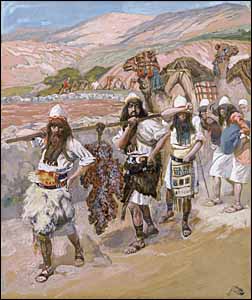 James J. Tissot, 'The Grapes of Canaan' (1896-1902), gouache on board, Jewish Museum, New York. |
We're going to digress from the big picture of the Conquest to a personal story of conquest -- one that has been forty-five years in the making.
The main character here is Caleb, by now an old man of 85 years. And we'll take the opportunity to look at his career of faith -- and God's faithfulness -- beginning at the time of the Exodus.
One of the 12 Original Spies (Numbers 13-14)
The first time we meet Caleb, the people of Israel are encamped at Kadesh Barnea, an oasis in the Negev desert south of the Promised Land. It has been only a year or two since they have come out of Egypt. The people have seen many miracles in that time -- the Red Sea opening, water from the rock, and manna to feed a multitude. They've fought the Amalekite raiders and won. Moses has received the Ten Commandments on Mount Sinai and destroyed the golden calf. The Israelites have ratified the Covenant, built the Tabernacle, and constructed the Ark of the Covenant. The essentials of their nationhood under God as their King have been established. It is now time to enter the Promised Land.
At that time, Caleb is about 40 years old, and a recognized leader of his tribe, the tribe of Judah, largest of the twelve tribes. The Lord has given Moses this directive:
"Send some men to explore the land of Canaan, which I am giving to the Israelites. From each ancestral tribe send one of its leaders." (Numbers 13:2)
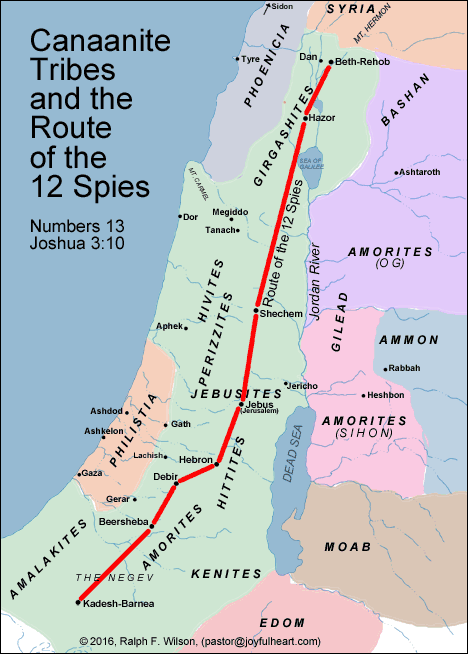
So Caleb and eleven of his peers are sent on a reconnaissance
mission into Canaan. They go north along the ridge of mountains that provide the
backbone of the country, from Hebron in the south all the way to Rehob[49]
at the north end of the land. Perhaps they are posing as traders; we don't know.
Along the way they observe carefully what they see: the nature of the cities and
villages and their fortifications, the produce of the
land and its potential. Since they will be dividing up the land between the twelve tribes, it is important that representatives from all the tribes be in on this initial survey of the land.
But they are particularly impressed with the city of Hebron, a walled city in the south, perched nearly at the crest of the mountain chain at about 3,000 feet elevation. It is an ancient city, built seven years prior to Zoan in Egypt (which places its founding at about 1700 BC). What the spies see sobers them. For in this strongly fortified city live a race of giant men called the descendants of Anak, the Anakites or the Anakim. (The "-im" suffix in Hebrew usually indicates the plural.)
When the spies return, they carry a huge cluster of grapes -- the fruit of the land -- on a pole between them. They talk about the abundance of the land, "it does flow with milk and honey." But ten of the spies are clearly frightened by the prospect of conquest.
"The people who live there are powerful, and the cities are fortified and very large. We even saw descendants of Anak there. We seemed like grasshoppers in our own eyes, and we looked the same to them." (Numbers 13:28, 33)
The "bad report" of the ten spies is contagious. By nightfall, their negative assessment of the danger has spread throughout the camp, and with it the infectious fear of these tribal leaders. "That night all the people of the community raised their voices and wept aloud" (Numbers 14:1). Women were sobbing that their husbands would be killed in battle and their children left fatherless. By morning, the men were ready to rebel, select another leader, and return to Egypt.
Caleb's Faith
But in the midst of this fear and unbelief two men stood firm in faith and hope -- Caleb and Joshua. When the ten spies were sharing their tale of terror, the scripture reports,
"Then Caleb silenced the people before Moses and said, 'We should go up and take possession of the land, for we can certainly do it." (Numbers 13:30)
The next day also, Caleb and Joshua try to sway the gathered Israelite crowds with their faith:
"The land we passed through and explored is exceedingly good. If the LORD (Yahweh) is pleased with us, he will lead us into that land, a land flowing with milk and honey, and will give it to us. Only do not rebel against the LORD. And do not be afraid of the people of the land, because we will swallow them up. Their protection is gone, but the LORD is with us. Do not be afraid of them.'" (Numbers 14:7-9)
Notice the positive attitude. Notice the explicit mention of Yahweh in their words. The ten spies don't even mention the LORD, only what they have seen that terrifies them. Joshua and Caleb have seen the same giants and the same heavily fortified cities, but they are looking through lenses of faith. They see the LORD enabling them to conquer these people.
But that day fear prevailed. Without a people united in faith behind Moses, any enterprise would be doomed to failure. The unbelief which had spread throughout the camp resulted in disunity and rebellion -- as fear and unbelief always do. The LORD was angry with the people and vowed that none of their generation would enter the Promised Land, only Caleb and Joshua.
This famous act of rebellion is memorialized in Psalm 95 and later quoted in Hebrews 3:7-19.
"Today, if you hear his voice,
do not harden your hearts as you did at Meribah,
as you did that day at Massah in the desert,
where your fathers tested and tried me,
though they had seen what I did.
For forty years I was angry with that generation;
I said, 'They are a people whose hearts go astray,
and they have not known my
ways.'
So I declared on oath in my anger,
"They shall never enter my rest." (Psalm 95:7b-11)
But Caleb and Joshua are different. They are the exceptions. They have faith, and the obedience to follow God's directions.
"But because my servant Caleb has a different spirit and follows me wholeheartedly, I will bring him into the land he went to, and his descendants will inherit it." (Numbers 14:24)
We see a similar quotation in Deuteronomy, where Moses recounts for the children of these rebels what God has said:
"... except Caleb son of Jephunneh. He will see it, and I will give him and his descendants the land he set his feet on, because he followed the LORD wholeheartedly." (Deuteronomy 1:36)
Following Fully
Caleb followed the LORD "wholeheartedly" (NIV), with "complete fidelity" (NRSV), "wholly" (ESV, KJV).[50] What a testimony! So often we follow the Lord mostly, or when it suits us. But when things get tough, and we must lean on faith rather than sight, we balk. Fear sets in, and we follow our fears instead of our faith.
Caleb is what Dr. Robert Schuller would have called a "possibility thinker," one who sees himself walking into the future, not alone, but leaning on the strong arm of his God. Friend, are you following God fully right now? Are you fully obedient? If not, what in you needs to change so you can align yourself with him?
Q1. (Numbers 14:24; Joshua 14:8) What does it mean to
follow the Lord "wholly" or "wholeheartedly"? How did Caleb and Joshua differ
from the other spies? How does fear in leaders keep God's people from doing his
will? Why was God angry with Israel for their unwillingness to enter the
Promised Land?
https://www.joyfulheart.com/forums/topic/1668-q1-following-wholeheartedly/
Was Hebron Reconquered by Caleb? (Joshua 14)
The sequence of Caleb's taking of Hebron in Joshua 14 is difficult for scholars to resolve completely. There are two differing points of view.
1. Detailed account. According to this view, the account of the taking of Hebron and Debir in Joshua 11:22-23 "is anticipated and summarized as part of the conquest of the southern coalition." Thus the account in Joshua 14
"... is intended as a detailed development of the campaign in chapter 11 and is signaled by both accounts ending with the phrase, 'Then the land had rest from war.' Thus this account is part of the overall conquest of the south."[51]
According to this view, the account of Caleb's driving out of the Anakites (14:12; 15:14) took place under Joshua's generalship. Joshua is given credit, though his lieutenants fought the actual battles.[52]
2. Reconquest. However, it is also possible to see the southern campaign in Joshua 11 as the initial campaign to defeat the kings of these cities. Hebron was conquered by Joshua's army initially, but the inhabitants returned when the armies left, and they needed to be dislodged again by Caleb when he was ready to take possession.
This apparently happened to Jerusalem (which was called Jebus). The king of Jerusalem was captured and killed by Joshua (11:22-26), though some of his fleeing army were able to reach the fortified city of Jerusalem (11:20). But in Joshua's time, the Israelites were not able to take Jerusalem (15:63; Judges 1:21); the city was occupied by David only centuries later (2 Samuel 5:6), though Jebusites still owned property in the city after its capture (2 Samuel 24:18-25).
According to this view, when it comes to settling his family a few years later, Caleb and his clan have to reconquer the giants, who apparently escaped the initial battles and lived in Philistine cities for a time (11:21-22).
Either of these two interpretations is possible, but I'm more inclined to the latter, where battles by the tribal militia took place during the settlement period to finally clear the land and cities so that the Israelite families could settle in them.
In the final analysis, it doesn't matter greatly which way it went. We know in our own personal spiritual battles that sometimes ground that we conquered early in our Christian lives is lost because we failed to occupy it fully, and must be re-won. The battle is not over until we have fully occupied the ground. Then we must continue to defend it watchfully.
Caleb's Bold Claim (14:6-15)
When we come to Joshua 14, Caleb is identified as the legendary spy-leader from the tribe of Judah 45 years previous. As Judah's tribal spokesman, he addresses Joshua, his old comrade-in-arms. Joshua knows the story, but Caleb repeats it again for the sake of all the others who were only children at the time.
In the passage that follows, we hear "vintage Caleb," the voice of the old, faith-filled warrior who still believes in Yahweh's power.
"6 Now the men of Judah approached Joshua at Gilgal, and Caleb son of Jephunneh the Kenizzite said to him, 'You know what the LORD said to Moses the man of God at Kadesh Barnea about you and me. 7 I was forty years old when Moses the servant of the LORD sent me from Kadesh Barnea to explore the land. And I brought him back a report according to my convictions, 8 but my brothers who went up with me made the hearts of the people melt with fear. I, however, followed the LORD my God wholeheartedly. 9 So on that day Moses swore[53] to me, 'The land on which your feet have walked will be your inheritance and that of your children forever, because you have followed the LORD my God wholeheartedly.'" (14:7-9)
Before the land west of the Jordan is fully distributed by lot (if the chronology of these chapters is sequential), Caleb stakes his own claim, based on the promise made to him by Moses and confirmed by an oath (though we do not have a record elsewhere of Moses' specific promise).
"Give Me This Mountain" (14:12)
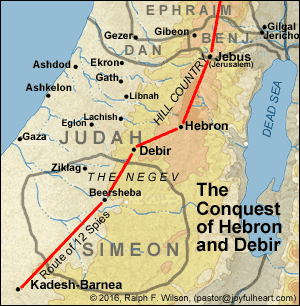 |
Caleb's faith is on full display in verses 10-12.
"Just as the LORD promised, he has kept me alive for forty-five years ... so here I am today, eighty-five years old!" (14:10a)
"I am still as strong today as the day Moses sent me out; I'm just as vigorous to go out to battle now as I was then." (14:11)
"Now give me this hill country ("mountain," KJV)[54] that the LORD promised me that day." (14:12a)
"You yourself heard then that the Anakites were there and their cities were large and fortified, but the LORD helping me, I will drive them out just as he said." (14:12b)
Notice that in three out of the four statements in this section, Caleb mentions the name of Yahweh. "The LORD promised... The LORD promised... the LORD helping me." Here is a man who has learned to trust in the promises of God and stake his whole future on them. He knows what it is like to have the LORD help him, and he is trusting that the LORD will continue to do so. This is exultant, powerful faith prior to the event. It sounds like bragging, but it is faith bragging on the power of God to keep his promises. I like that kind of faith!
Hebron
Joshua grants Caleb's request.
"13 Then Joshua blessed Caleb son of Jephunneh and gave him Hebron as his inheritance. 14 So Hebron has belonged to Caleb son of Jephunneh the Kenizzite ever since, because he followed the LORD, the God of Israel, wholeheartedly. 15 (Hebron used to be called Kiriath Arba after Arba, who was the greatest man among the Anakites.) Then the land had rest from war." (14:13-15)
Joshua gives Caleb Hebron as his inheritance. Apparently, the grant involves the whole hill country surrounding Hebron, including the city of Debir (15:13-19), also known as Kiriath-Sepher (15:15; Judges 1:11) and Kiriath Sannah (15:49).
But why Hebron? The Hebron district, especially around the great oaks of Mamre,"[55] had been the home of Abraham for many years.
"Abram moved his tents and went to live near the great trees of Mamre at Hebron, where he built an altar to the LORD." (Genesis 13:18)
There he purchased the cave of Machpelah for a burial place (Genesis 23:17).
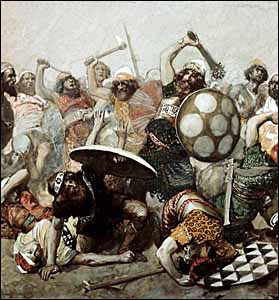 James J. Tissot, 'Joshua Destroys the Giants' (1896-1902), gouache on board, 8.75 x 8.25 in., The Jewish Museum, New York. |
Caleb and the other spies had walked hundreds of miles up to the northernmost part of Canaan and back again. His feet had trod on the whole country. But of all Palestine that could have been his for the asking, Caleb chooses Hebron.
I think he wanted Hebron because there were the Anakite giants that had so terrified his fellow scouts 45 years previously. "We looked like grasshoppers in their eyes," they whimpered. "Bring them on," says Caleb. "They're no match for the LORD!" Forty-five years before he had counseled, "Their protection is gone, but the LORD is with us" (Numbers 14:9). Now he has a chance to prove it as leader of "the men of Judah" (Judges 1:10). The giants represent the enemies of Conquest, and Caleb is ready for them.
Sheshai, Ahiman, and Talmai (15:14)
"From Hebron Caleb drove out the three Anakites -- Sheshai, Ahiman and Talmai -- descendants of Anak." (Joshua 15:14)
Scripture gives their names three times (here; Numbers 13:22; Judges 1:10). Why? Because their names were well known. Giants are what legends are made of, like Goliath of Gath. You only name great opponents, and these giants are great enemies -- with great reputations to match. But Caleb fearlessly drives them out. Doubtless the story was told again and again around the campfires, "Do you remember when Caleb...."
Ambition and Faith
I've sometimes wondered, where is the fine line between bald ambition and bold faith? Certainly, Caleb has cherished a forty-five-year-old ambition to defeat the Anakite giants. He has something to prove. He has a score to settle with them. Is this ambition of God? I believe so.
Look at Moses. Moses doesn't want to lead the people out of Egypt, but when he finally accepts this commission -- and God doesn't take "no" for an answer -- he puts all his heart and soul into the job. He personally identifies his cause with God's and his ambition with God's. When God wonders aloud about destroying the unbelieving Israelites, Moses knows God's heart and soul well enough to speak boldly about God's interests..
Sometimes, the people around godly leaders misunderstand. They mistake strong leadership for pride. Even those closest to Moses -- Aaron and Miriam -- accuse him of pride:
"Miriam and Aaron began to talk against Moses because of his Cushite wife, for he had married a Cushite. 'Has the LORD spoken only through Moses?' they asked. 'Hasn't he also spoken through us?' And the LORD heard this. (Now Moses was a very humble man, more humble than anyone else on the face of the earth.)" (Numbers 12:1-3)
Moses has internalized God's desires so that God's desires become Moses' ambitions. Men may see it as pride, but God sees Moses as a man after his own heart, one to whom God speaks "face to face.""
Caleb, too, has developed a bold faith. When he is bragging, he is bragging on God, and exalting God, not himself. He so identifies with God's cause that his ego is subsumed in God's -- much the same as that of the Apostle Paul a millennium later:
"I have been crucified with Christ and I no longer live, but Christ lives in me. The life I live in the body, I live by faith in the Son of God, who loved me and gave himself for me." (Galatians 2:20)
Of course, we need to examine our hearts to detect any self-exaltation we see there. It is certainly possible for leaders to develop an ugly, self-centered pride. But our boldness can and should be in the LORD.
"'Let him who boasts boast about this:
that he understands and knows me,
that I am the LORD, who exercises kindness,
justice and righteousness on earth,
for in these I delight,' declares the LORD" (Jeremiah 9:24)
Q2. (Joshua 14:6-14) Why is Caleb boastful in verse 12?
Is this a character flaw or a trait to be emulated? Why do you think he claimed
the hill country of Hebron for his inheritance? How can a strong leader be truly
humble? Why are strong leaders often tempted towards pride?
https://www.joyfulheart.com/forums/topic/1669-q2-boasting-in-faith/
A Faith-Filled Son-in-Law (15:15-17; Judges 1:11-13)
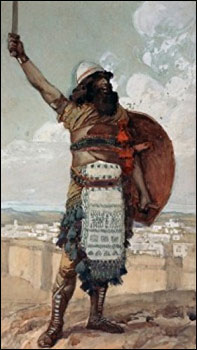 James J. Tissot, 'Othniel' (1896-1903), gouache on board, The Jewish Museum, New York. I used this low-res image as the basis of a watercolor I painted for the book cover for this series, since it is such a heroic stance. |
Now we move from the conquest of Hebron to the conquest of Debir, just 8 miles (13 km.) southwest of Hebron. [56] Debir (also known as Kiriath Sepher and Kiriath Sannah, 15:49) was a strategically placed, walled Canaanite city-state, ruled by a king (10:39; 12:13). Along with Hebron, this area had been occupied by the Anakites.
But for some reason, Caleb decides not to lead the attack himself. Rather, he throws out a challenge:
"15 From there he marched against the people living in Debir (formerly called Kiriath Sepher). 16 And Caleb said, 'I will give my daughter Acsah in marriage to the man who attacks and captures Kiriath Sepher.' 17 Othniel son of Kenaz, Caleb's brother, took it; so Caleb gave his daughter Acsah to him in marriage." (15:15-17)
In the West these days, fathers and mothers don't usually determine whom their daughters will marry. Love is blind, and love reigns. But in Caleb's day -- and to the present day in much of the East -- fathers decide whom their daughters will marry, and try to find for their daughters men who will do good by them, and enhance the family's fortunes. How better to select a son-in-law for your daughter than to offer her in marriage to the man who leads in the attack and capture of a fortified city? That way you get a bold, faith-filled son-in-law..
Othniel, son of Caleb's younger brother Kenaz (Judges 1:13), accepts the challenge and leads his forces to take the city. He, too, is a man of faith, and no doubt desires Acsah, whose name means "woman's anklet" (and the status of being Caleb's son-in-law). Though we might question marrying one's niece, it was not forbidden by the Mosaic Law (Leviticus 18), and was therefore allowable.
Apparently, this is the same Othniel who serves as a judge later on.
"9 But when the people of Israel cried out to the LORD, the LORD raised up a deliverer for the people of Israel, who saved them, Othniel the son of Kenaz, Caleb's younger brother. 10 The Spirit of the LORD was upon him, and he judged Israel. He went out to war, and the LORD gave Cushan-rishathaim king of Mesopotamia into his hand. And his hand prevailed over Cushan-rishathaim. 11 So the land had rest forty years. Then Othniel the son of Kenaz died." (Judges 3:9-11)
Q3. (Joshua 15:15-17; Judges 3:9-11) What can we deduce
about Othniel's character from Joshua 15:15-17? Why does Caleb offer his
daughter in marriage? How does this narrow the selection of a son-in-law? What
is the power behind Othniel's judgeship according to Judges 3:10?
https://www.joyfulheart.com/forums/topic/1670-q3-othniels-character/
A Faith-Filled Daughter (15:17-19)
Like father, like daughter. Acsah seems to possess the boldness that characterizes her father.
"17 And Othniel the son of Kenaz, the brother of Caleb, captured it. And he gave him Acsah his daughter as wife. 18 When she came to him, she urged him to ask her father for a field. And she got off her donkey, and Caleb said to her, 'What do you want?' 19 She said to him, 'Give me a blessing. Since you have given me the land of the Negeb, give me also springs of water.' And he gave her the upper springs and the lower springs." (15:17-19)
Acsah asks her husband to request a field from her father Caleb, who controls the land in the region around Debir.[57] But she doesn't wait for her request to go through channels. As soon as she sees her father, while alighting from her donkey, Caleb can see that she has something on her mind (perhaps Othniel has warned him that she wants the field), so Caleb asks her, "What can I do for you."
"She replied, 'Do me a special favor. Since you have given me land in the Negev [desert], give me also the springs of water.' So Caleb gave her the upper and lower springs." (15:19))
Negev is often used as a place name, but means here seems to be used generically as "desert-land,"[58] since Debir is not in what was considered the Negev proper, but in a comparatively dry location.[59]
Arid land is worthless without water. If Acsah is going to live in Debir, she would need water.
So she asks for the "upper springs" and "lower springs." These must refer to water sources outside the natural territorial limits of Debir, but close enough to be transferred to its jurisdiction. The word translated "springs" is gullōṯ, literally "basin(s)," defined by W. F. Albright as "subterranean pockets and basins of water under some of the wadis," to which access was gained by cutting a well shaft through the rock in the dry creek beds.[60]
So she comes boldly to her father and asks for what she needs. Caleb grants it to her without a quarrel.
Caleb knows the LORD and the LORD'S willingness to fulfill his promises. And Acsah knows her father and doesn't hesitate to ask for what she needs. She knows he will grant it. That, too, is faith. When we know our Heavenly Father, we aren't afraid to ask for what we need, for we know that he loves us and delights in blessing us.
Acsah is a woman who will not be denied her full inheritance. So often we are too timid or afraid to boldly take what God promises us. We see examples of similar strong women in the New Testament.
- The woman with the flow of blood presses through the crowd to get close enough to Jesus that she can touch the hem of his garment, and receives her healing -- and commendation from Jesus (Luke 8:43-48; Matthew 9:20-22; Mark 5:24-34).
- The Syro-Phoenician woman presses Jesus to heal her daughter, even though she is a foreigner and not a Jew, and receives her request with Jesus' admiration of her faith (Matthew 15:21-28; Mark 7:24-30).
- A sinful woman anoints Jesus in a Pharisee's home out of thankfulness and love, and though scorned by the Pharisee, receives assurance of forgiveness and salvation from Jesus (Luke 7:36-50).
- Mary of Bethany, motivated by love, anoints Jesus with extravagantly expensive perfume, though the disciples rebuke her for it. Jesus promises that her story will be retold wherever the gospel is preached (John 12:1-8; Matthew 26:6-13; Mark 14:3-9).
- The persistent widow is featured in one of Jesus' parables where she won't quit pestering an unjust judge until he gives her justice (Luke 18:1-5).
Q4. (Joshua 15:17-19) What do we learn about Acsah's
character from this passage? Name some examples of strong women of faith in the
Bible. Name some strong women of faith you have known personally.
https://www.joyfulheart.com/forums/topic/1671-q4-acsahs-character/
A Faith-Filled Heritage
We, too, like Caleb, Othniel, and Acsah, are part of a faith-filled family of God's people throughout the ages. Exemplars of faith are found on the pages of the Bible -- as well as in the lives of mature men and women in our churches. For our children and for generations to follow, you and I are the exemplars of faith. We are the ones who need to take hold of God with a tenacious boldness and not let go, that we might raise up children in the faith after us.
"Wherefore seeing we also are compassed about with so great a cloud of witnesses, let us lay aside every weight, and the sin which doth so easily beset us, and let us run with patience the race that is set before us, looking unto Jesus the author and finisher of our faith...." (Hebrews 12:1-2a, KJV))
Lessons for Disciples
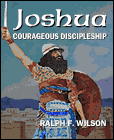
Lessons in book formats are available. |
Caleb's story offers a number of lessons of faith we can learn.
- God honors those who follow wholly or wholeheartedly. Disciples must not only see the realities of our world, but fearlessly obey the Lord, even though the obstacles are great (Numbers 14;24; 14:8).
- We need to have a long-term view of waiting on God to fulfill his promises. Then, when the time is right, move boldly forward.
- Disciples boast in the Lord, though they must be careful to be humble before the Lord.
- One way of discerning leadership in others is to place before them a challenge and see who rises to the challenge (Joshua 15:15-17; Judges 3:9-11).
- There is a long tradition of strong women of God (and men) who are not content to let life happen to them, but who press in to receive God's promise (Joshua 15:17-19). We should seek to follow in their steps.
Prayer
Lord, thank you for men and women of faith who held on until they received the promise. Forgive us for our "little faith." But we ask you to give us the kind of tenacious faith and patience, that we too might be known as believers in the Living God like Caleb. In Jesus' name, we pray. Amen.
Key Verses
"I ... followed the LORD my God wholeheartedly. So on that day Moses swore to me, 'The land on which your feet have walked will be your inheritance and that of your children forever, because you have followed the LORD my God wholeheartedly.'" (Joshua 14:8-9, NIV)
"Here I am today, eighty-five years old! I am still as strong today as the day Moses sent me out; I'm just as vigorous to go out to battle now as I was then. Now give me this hill country that the LORD promised me that day. You yourself heard then that the Anakites were there and their cities were large and fortified, but, the LORD helping me, I will drive them out just as he said." (Joshua 14:10b-12, NIV)
"Caleb said, 'I will give my daughter Acsah in marriage to the man who attacks and captures Kiriath Sepher.' Othniel son of Kenaz, Caleb's brother, took it; so Caleb gave his daughter Acsah to him in marriage." (Joshua 15:16-17, NIV)
"[Acsah] replied, 'Do me a special favor. Since you have given me land in the Negev, give me also springs of water.' So Caleb gave her the upper and lower springs." (Joshua 15:19, NIV)
Endnotes
[49] Rehob is a city "near the entrance of Hamath" (Numbers 13:21), probably the same as Beth-Rehob (2 Samuel 8:3; 10:6, 8; Judges 18:28). This was probably located at the southern foot of Mt. Hermon (A.A. Anderson, 2 Samuel [Word Biblical Commentary; Word, 1989], p. 132), near Dan, probably the present-day Lebweh on the Orontes River below Riblah (Timothy R. Ashley, The Book of Numbers [The New International Commentary on the Old Testament; Eerdmans, p. 237).
[50] "Wholeheartedly" (NIV), with "complete fidelity" (NRSV), "wholly" (ESV, KJV) is Hebrew mâlêʾ, "to be full." In the Piel stem it has the meaning "remain loyal to" (Holladay, 195).
[51] Hess, Joshua (Tyndale), pp. 240-41.
[52] Woudstra, p. 197, footnote 14, considers this a possibility, though he sees a reconquering of Hebron.
[53] "Swore" is the Niphal stem of shābaʿ, "pledge" (Holladay, p. 359, 3). The verb is closely related to the Hebrew word for "seven."
[54] "Hill country" (NIV, NRSV, ESV), "mountain" (KJV) is har, which means in the singular (as here), "mountains, mountain range" (Holladay, p. 83).
[55] "Trees" (NIV), "oaks" (NRSV, ESV), "plain" (KJV) is the plural of ʾēlôn, "great tree, tree of God." The noun is derived from ʾel/ohim, "God." (Holladay, pp. 16-17).
[56] Biblical Debir is probably to be identified with the present village of Khirbet Rabûd (A.F. Rainey, "Debir," ISBE 1:903-904).
[57] The Septuagint, on the contrary, indicates that Othniel asked Acsah to ask her father.
[58] "Negev" (NIV), "Negeb" (NRSV, ESV), "a south land" (KJV) is negeb, "south," then "desert-land" of the Negeb, in the south of Canaan (Holladay, p. 225).
[59] William S. La Sor, "Kiriath-sepher," ISBE 3:42.
[60] Woudstra, Joshua, p. 242.
Copyright © 2026, Ralph F. Wilson. <pastor![]() joyfulheart.com> All rights reserved. A single copy of this article is free. Do not put this on a website. See legal, copyright, and reprint information.
joyfulheart.com> All rights reserved. A single copy of this article is free. Do not put this on a website. See legal, copyright, and reprint information.


 To be notified about future articles, stories, and Bible studies, why don't you subscribe to our free newsletter, The Joyful Heart, by placing your e-mail address in the box below. We respect your
To be notified about future articles, stories, and Bible studies, why don't you subscribe to our free newsletter, The Joyful Heart, by placing your e-mail address in the box below. We respect your